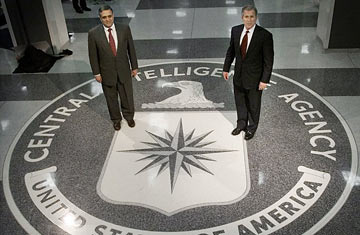
Former CIA director George Tenet, left, and former President George W. Bush
As CIA Director Leon Panetta journeys to Capitol Hill to testify this week, there is reportedly a movement afoot in the Obama Administration that could diminish the agency's role in counterterrorism. Dubbed the "global justice" initiative, the new law-enforcement approach would give the FBI and the Department of Justice a more prominent part in collecting evidence against and questioning terrorists and bringing more cases to a civilian criminal trial, according to the Los Angeles Times. The CIA will still collect intelligence on counterterrorism. And no one right now is talking about putting a ban on CIA interrogations of terrorism suspects. But given the right political climate, that is where this initiative could be heading.
And that, despite what some CIA loyalists might reflexively think, would be great news for the agency. In fact, if I were Panetta, I would neatly gift wrap counterterrorism, put a bow on the top, and hand it over to FBI Director Robert Mueller. It can't be any clearer that renditions, harsh interrogations (if not torture) and secret prisons have been a catastrophe for the CIA, promising to tie it up legally for years to come, not to mention completely overshadow its successes. With the torture scandal sucking up all the oxygen, who today remembers that it was the CIA in the months before 9/11 that was jumping up and down on the table warning that bin Laden was about to attack us? (Read "The CIA's Silent War in Pakistan.")
None of this is to say the FBI can't do a good job at counterterrorism. On the contrary, the FBI investigated the 1998 African bombings, breaking open our understanding of al-Qaeda. Special agents in the FBI's New York office came to know al-Qaeda as well as anyone in the government. However, the FBI was forced to take a backseat when the CIA resorted to abusive interrogations, depriving us of expertise we so badly needed.
There's an old piece of wisdom inside the Beltway, one that carries a lot more truth than most: the FBI catches bank robbers, and the CIA robs banks. I suppose you have to swim in this sea to really understand what this means.
But to give you an idea, the other day I was on the phone with an FBI agent about a wanted terrorist. I'd heard he was holed up in some city in the Middle East. The FBI agent asked how I knew this. A rumor, I answered, adding I had no idea whether there was any truth to it. I'm certain the FBI agent took notes, but only to file them away. An FBI agent needs solid, actionable information — solid enough to arrest people, convict them in a court of law and put them behind bars. In this case, the FBI needed an address, a phone number, a license plate — anything to act on. On the other hand, the CIA is conditioned to steal anything that looks like a secret, even a suspect one, letting analysts in Washington sort out the truth from fiction. The FBI and CIA cultures couldn't be more different.
The biggest mistake the Bush Administration made was not criminalizing 9/11 and making the FBI the lead investigator. This would not have stood in the way of Pakistan arresting 9/11 mastermind Khalid Sheikh Mohammed (K.S.M.). In a war of ideas, we would have been well served as a country to have put K.S.M. on public trial, confronting him with damning evidence and exposing the bloody insanity of a man who has caused the death of more Muslims than anyone in modern history. But now, thanks to waterboarding and other interrogation abuses, this option may be closed off to us. (Read "Why the CIA Turned Down Dick Cheney.")
Another problem with not giving the 9/11 investigation to the FBI was that we did not get a full account of what happened on 9/11. The CIA analysts who prepared the questions used in the interrogations wanted to know one thing: when and where was the next attack coming. By the time it came around to asking K.S.M. about the archeology of 9/11 — such as who recruited the 15 Saudis, the muscle — K.S.M.'s responses could no longer be relied on. After the daily waterboardings, he said anything he thought his interrogators wanted to hear.
A lead FBI role on terrorism does nothing to prevent the CIA from collecting as it has in the past. It can forward leads to the FBI, and let the FBI decide the evidence it should follow up on or, as often as not, discard.
Baer, a former CIA field officer assigned to the Middle East, is TIME.com's intelligence columnist and the author of See No Evil and, most recently, The Devil We Know.
